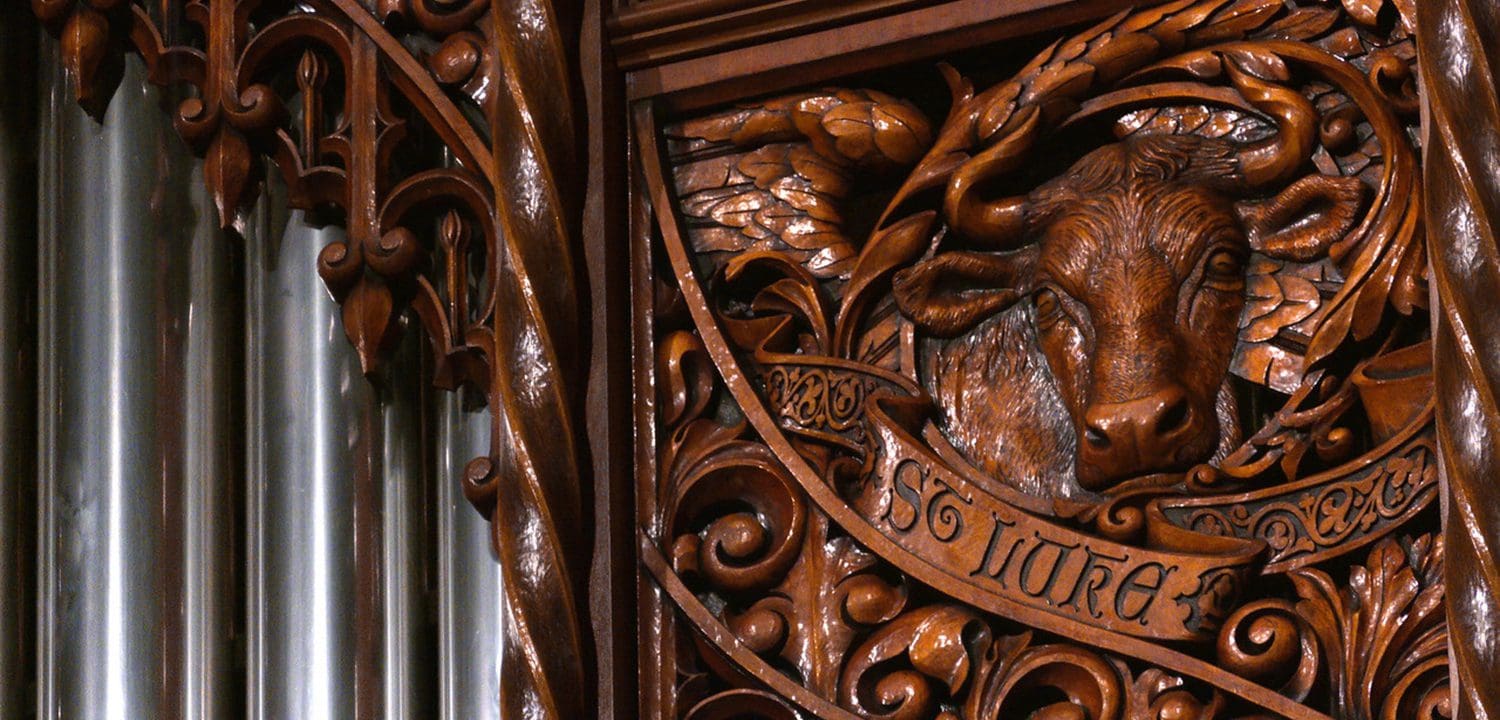audio_file: 281985

Saint Luke depicted as an Ox in the wood carvings of the Miller-Scott Organ
Luke the Evangelist, or, in other words, the writer of the Gospel according to Luke and the Acts of the Apostles, wrote a full quarter of the new testament. His contribution to the Bible is a kind of General History of Christianity in two loosely connected monographs. In these two books, the first historian of Christianity shows us that the story of Jesus’ life and ministry and the founding of the Church should be considered together. Luke is committed to manifesting the ministry of Christ to those who are separated both geographically and temporally. He was writing to young Christians like Theophilus that weren’t eyewitnesses or contemporaries, necessarily, of all those pivotal, early days. He was writing to us. He was writing to people two thousand years from now. And for that solemn purpose, Luke made a great deal of effort to make it clear that this was not a collection of legends or pious fables, but a faith that was grounded in history made up of events, journeys, shipwrecks and sacrifices. Our faith is a story that happened, a history that is still happening in us, and through us, working out our salvation.
Many early Christians believed that history was at an end, that Christ was coming within their lifetimes to merge heaven and earth and set things right. But, when this didn’t happen in short order, it was people like Luke the Evangelist who spoke of the time of the Church as something that would last indefinitely, until the End. His history, a pastoral history, in a way, shows us that ours is the Age of the Holy Spirit, one of hope and expectation, when the work of Christ continues, until Christ comes in his fullness.
The most we know about Luke is what we find in the two books he wrote for us. To say much more is to speculate. We think that Luke was born in Syria, and that he may have been not only a physician but an emancipated slave. His full name, Lucanus, could be translated to be “born at dawn” or “dawnborn,” a child of the light. He was not one of the Twelve disciples, but he could have been among one of the 70 disciples that Jesus called during his ministry to go out two by two into Galilee. Some assert that he was one of the unnamed disciples that was with the Resurrected Jesus on the Road to Emmaus. But we do know that he was a fellow traveller with the Apostle Paul, all over the Mediterranean world, even being present with Paul during his imprisonment in Rome, before Paul’s execution. We don’t know much more about what happened to him after that. There are at least three bodies that came to be said to be his, that were revered as relics, each with their own history.
In iconography, Luke is presented as an Ox with wings. This is one of the four beasts that Ezekiel envisioned around the throne of heaven, which we, after Christ, affixed to our understanding of each of the four gospels. In Luke’s case, the Winged Ox is his because of the significance he places on the meaning of the sacrifice of Christ, hence a winged sacrificial animal is his sigil.
Luke’s work is of a piece with what the prophet Isaiah foretold about God’s messiah: “The Lord has bared his holy arm before the eyes of all the nations; and all the ends of the earth shall see the salvation of our God.” Luke taught us that the sacrifice of Christ was not just for his own people, the Jews, but was intended for the whole world, for every people out there, even the Romans. His diptych of Gospel and Acts of the Apostles starts with the journey of Christ from Nazareth to Jerusalem, and the next book leads the movement of the Gospel from Jerusalem to Rome. The arrival of the Gospel, at great cost, in Rome is the breakthrough moment of the Christ-event after the Resurrection, because if Jerusalem was the center of the Jewish world, Rome was the center of the Gentile world, worlds that would become intertwined like never before, thanks to Jesus of Nazareth. The suffering of Christ, the sacrifice of Christ, is not of parochial concern, but one of global consequence, beyond the Chosen People, beyond the Promised Land. And in ending his accounts with the establishment of the Church in Rome, he sets the stage, a world’s stage, for even more history to unfold. It seems that all peoples are now the people of God. All people are now chosen, even the Romans who killed the Lord of Life. The mercy boggles the spirit. In Luke’s vision of the Gospel of Christ, the entire world is now the staging ground for the work of God, our plot of land included.

